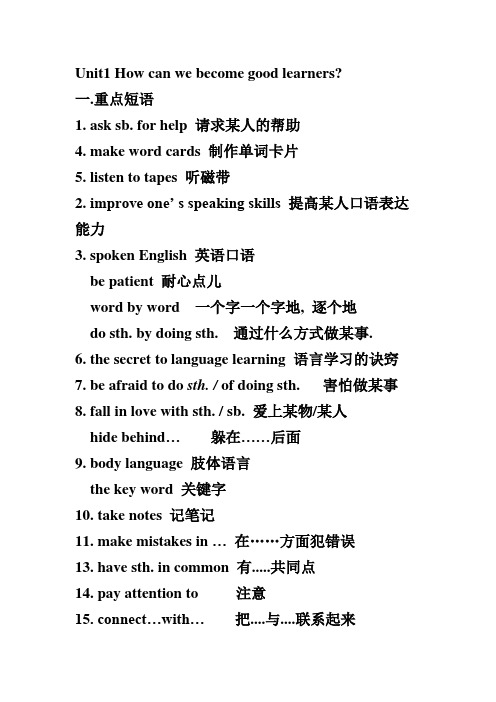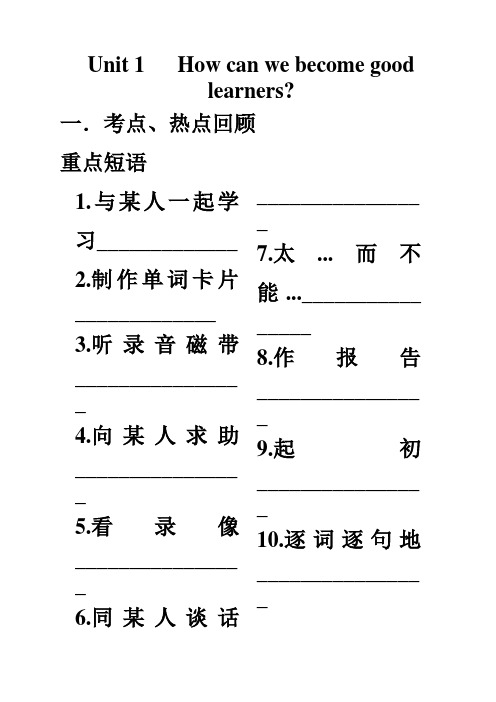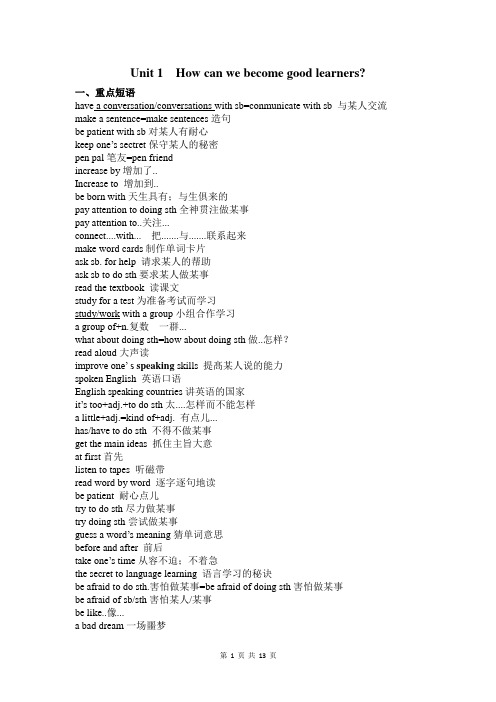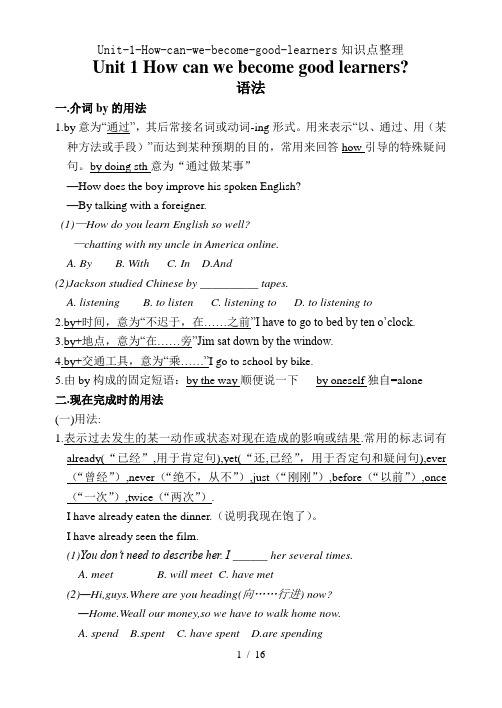重点短语(Unit_1_How_can_we_become_good_learners)同步练习
- 格式:doc
- 大小:54.00 KB
- 文档页数:3

Unit 1 How can we become good learners单元短语1.work with sb及某人一起学习2.make word cards制作单词卡片3.listen to tapes听录音磁带4.ask sb for help向某人求助5.watch videos看录像6.have conversations with sb同某人谈话7.too...to..太...而不能...8.give a report作报告9.at first起初10.word by word逐词逐句地11.the secret to.... ...的秘诀12.be afraid to do sth胆怯做某事 1 3.fall in love with爱上... 14.body language肢体语言15.as well也16.a piece of cake小菜一碟;很简单的事17.look up查阅;查找 . 18.so that以便;为了19.repeat out loud大声跟读20.take notes记笔记21.sentence patterns句型22.spoken English英语口语23.make mistakes in在...方面犯错24.the ability to do sth做某事的实力25.depend on视...而定;取决于;依靠26.pay attention to留意;关注27.connect...with... 把...和...连接或联系起来28.get bored感到厌烦29.try to do sth尽力做某事30.be stressed out焦虑不安的31.be afraid of胆怯... 32.each time每当;每次语法知识:提问方式How do you...?或How can I...答语: by+doing形式,“通过做...”的方式Eg: How do you study for a test How can I turn on the lightI study by working with a group. By turning this button.拓展:介词by的其他用法:1)by+交通工具,“乘/坐...” by bus2)by+地点,“在...的旁边;靠近...” by the lake3)by+时间,= before“截止到...;不迟于...” by ten4)辨析by, with, in,“用”“用”某种手段, 交通工具, 传递方式或媒介等侧重“用”有形工具, 材料, 内容等“用”语言, 语调, 笔墨, 颜色等知识点讲解:section A1.by asking the teacher for help通过向老师求助。

Unit1 How can we become good learners?一.重点短语1. ask sb. for help 请求某人的帮助4. make word cards 制作单词卡片5. listen to tapes 听磁带2. improve one’ s speaking skills 提髙某人口语表达能力3. spoken English 英语口语be patient 耐心点儿word by word 一个字一个字地, 逐个地do sth. by doing sth. 通过什么方式做某事.6. the secret to language learning 语言学习的诀窍7. be afraid to do sth. / of doing sth. 害怕做某事8. fall in love with sth. / sb. 爱上某物/某人hide behind…躲在……后面9. body language 肢体语言the key word 关键字10. take notes 记笔记11. make mistakes in … 在……方面犯错误13. have sth. in common 有.....共同点14. pay attention to 注意15. connect…with…把....与....联系起来16. write down key words 写下/记下重点词18. be born with 天生具有19. do sth. on one’s own 独立做某事21. depend on 依赖;取决于It takes time. 这得花点时间. 这得慢慢来. It’s a piece of cake. 小菜一碟/太容易了!It serves you right. 自作自受. 活该.。

Unit 1 How can we become good learners知识点详解一、词汇1. textbook [ˈtekstbʊk] n. 教科书;课本2. conversation [ˌkɒnvəˈseɪʃn] n. 交谈;谈话3. aloud [əˈlaʊd] adv. 大声地;出声地4. pronunciation [prəˌnʌnsiˈeɪʃn] n. 发音;读音5. sentence [ˈsentəns] n. 句子6. patient [ˈpeɪʃnt] adj. 有耐心的;n. 病人7. expression [ɪkˈspreʃn] n. 表达(方式);表示8. discover [dɪˈskʌvə(r)] v. 发现;发觉9. secret [ˈsiːkrət] n. 秘密;秘诀;adj. 秘密的;保密的10. look up (在词典、参考书中或通过电脑)查阅;抬头看11. grammar [ˈɡræmə(r)] n. 语法12. repeat [rɪˈpiːt] v. 重复;重做13. note [nəʊt] n. 笔记;记录;v. 注意;指出14. pal [pæl] n. 朋友;伙伴15. physics [ˈfɪzɪks] n. 物理;物理学16. chemistry [ˈkemɪstri] n. 化学17. memorize [ˈmeməraɪz] v. 记忆;记住18. pattern [ˈpætn] n. 模式;方式19. pronounce [prəˈnaʊns] v. 发音20. increase [ɪnˈkriːs] v. 增加;增长21. speed [spiːd] n. 速度22. partner [ˈpɑːtnə(r)] n. 搭档;同伴23. born [bɔːn] v. 出生;adj. 天生的24. be born with 天生具有25. ability [əˈbɪləti] n. 能力;才能26. create [kriˈeɪt] v. 创造;创建27. brain [breɪn] n. 大脑28. active [ˈæktɪv] adj. 活跃的;积极的29. attention [əˈtenʃn] n. 注意;关注30. pay attention to 注意;关注31. connect [kəˈnekt] v. (使)连接;与……有联系32. connect...with... 把……和……连接或联系起来33. overnight [ˌəʊvəˈnaɪt] adv. 一夜之间;在夜间34. review [rɪˈvjuː] v. & n. 回顾;复习35. knowledge [ˈnɒlɪdʒ] n. 知识;学问36. wisely [ˈwaɪzli] adv. 明智地;聪明地二、短语1. make mistakes 犯错误2. be afraid to do sth. 害怕做某事3. laugh at 嘲笑;取笑4. take notes 记笔记5. look for 寻找6. find out 查明;找出7. be interested in 对……感兴趣8. depend on 取决于;依靠9. in common 共同;共有10. pay for 为……付款;付钱11. as well 也;又12. for example 例如13. think about 考虑14. be good at 擅长15. instead of 代替;而不是16. write down 写下;记下17. keep a diary 记日记18. have a try 试一试19. worry about 担心;担忧20. make a plan 制定计划21. come from 来自22. work with 与……一起工作23. give up 放弃24. be proud of 为……感到骄傲25. deal with 处理;应付26. get into trouble 陷入困境27. ask for help 寻求帮助28. get bored 感到无聊29. fall in love with 爱上;喜欢上30. make friends with 与……交朋友31. in the end 最后;终于32. be able to 能够33. look forward to 盼望;期待三、句型1. —How do you study for a test? 你是如何为考试而学习的?—I study by working with a group. 我通过与小组合作来学习。

Unit 1 How can we become goodlearners?一.考点、热点回顾重点短语1.与某人一起学习_____________2.制作单词卡片_____________3.听录音磁带_______________ _4.向某人求助_______________ _5.看录像_______________ _6.同某人谈话_______________ _7.太...而不能...___________ _____8.作报告_______________ _9.起初_______________ _10.逐词逐句地_______________ _11....的秘诀_______________ _12.害怕做某事_______________ _17.爱上...___________ _____18.肢体语言_______________ _19.也_______________ _20.小菜一碟;很容易的事_______________ 21.查阅;查找_______________ _22.以便;为了_______________ _23.大声跟读_______________ _24.记笔记_______________ _25.句型_______________ _26.英语口语_______________ _27.在...方面犯错_______________ _28.做某事的能力_______________ _13.取决于;依靠_______________ _14.注意;关注_______________ _15.感到厌烦_______________ _29.尽力做某事________________30.焦虑不安的_______________ _31.害怕...___________ _____16.每当;每次_______________ 32.把.和...连接起来_______________ _重点句型:1.“越...越...”的表达法: The more you read, the faster you’ll be.2.so...that..引导结果状语从句:The teacher spoke so quickly that I did not understand her most of the time.3.so that引导目的状语从句:I want to learn new words so that I can have a better understand of English movies.4.谈论做事方式:(1)—How do you learn English? —I learn by studying with a group.(2)—Do you learn English by reading aloud?Yes, I do. It helps my pronunciation.5.whether引导主语从句:But whether or not you can do this well depends on your learning habits.知识点讲解:一.--------How do you learn English? —I learn by studying with a group.1.“by+doing形式”表示方式、方法语法结构by+doing形式,“通过做...的方式”I learnChinese bylistening totapes。

Unit 1 How can we become good learners?一、重点短语have a conversation/conversations with sb=conmunicate with sb 与某人交流make a sentence=make sentences造句be patient with sb对某人有耐心keep one’s sectret保守某人的秘密pen pal笔友=pen friendincrease by增加了..Increase to 增加到..be born with天生具有;与生俱来的pay attention to doing sth全神贯注做某事pay attention to..关注...connect....with... 把.......与.......联系起来make word cards制作单词卡片ask sb. for help 请求某人的帮助ask sb to do sth要求某人做某事read the textbook 读课文study for a test为准备考试而学习study/work with a group小组合作学习a group of+n.复数一群...what about doing sth=how about doing sth做..怎样?read aloud大声读improve one’ s speaking skills 提髙某人说的能力spoken English 英语口语English speaking countries讲英语的国家it’s too+adj.+to do sth太....怎样而不能怎样a little+adj.=kind of+adj. 有点儿...has/have to do sth 不得不做某事get the main ideas 抓住主旨大意at first首先listen to tapes 听磁带read word by word 逐字逐句地读be patient 耐心点儿try to do sth尽力做某事try doing sth尝试做某事guess a word’s meaning猜单词意思before and after 前后take one’s time从容不迫;不着急the secret to language learning 语言学习的秘诀be afraid to do sth.害怕做某事=be afraid of doing sth害怕做某事be afraid of sb/sth害怕某人/某事be like..像...a bad dream一场噩梦so ..that..如此...以至于..most of the time大多数时间because of +短语(前面无逗号隔开)hide behind..躲藏在...fall in love with.. 爱上...begin to do sth=start to do sth开始做某事(还未做)begin doing sth=start doing sth开始做某事(正在进行中)body language 肢体语言get the meaning理解到意思key words关键词listen for倾听;留神地听as well也;同样地listen to the conversations听对话so that以便于look them up in a dictionary 在词典里查阅它们take/make notes 记笔记have a better understanding of sth对..有更好的理解practice doing sth练习做某事improve your pronuciation提高发音技巧repeat out aloud 大声跟读/重复do exercise做运动do (grammar) secercises做(语法)练习write e-mails to my pen pals给笔友写邮件memorize sentence patterns 记句型keep/write a diary in English写英语日记make mistakes/a mistake in grammar 犯语法错误have sth in common 有.....共同,点get bored 变得无聊write/take down key words 摘抄重点词after class/school 课/放学后be interested insth/ doing sth对某事感兴趣/做某事感兴趣be in class 在课堂上/be in danger在危险中be in red穿着红色的衣服/be in silence沉默do sth on one’s own 独立做某事do sth bit by bit 慢慢地做某事do sth over and over again 一遍又一遍地做某事increase my reading speed加快我的阅读速度the ability to learn学习能力whether or not 不论;是否learning habits 学习习惯/ living habits生活习惯/ eating habits饮食习惯worry about...为.......而担忧depend on 依赖;取决于for a long time很长时间connect ...to使..相连接be good at sth=do well in sth擅长做某事Practce makes perfect. 熟能生巧。

Unit 1 How can we become good learners?语法一.介词by的用法1.by意为“通过”,其后常接名词或动词-ing形式。
用来表示“以、通过、用(某种方法或手段)”而达到某种预期的目的,常用来回答how引导的特殊疑问句。
by doing sth意为“通过做某事”—How does the boy improve his spoken English?—By talking with a foreigner.(1)—How do you learn English so well?—chatting with my uncle in America online.A. ByB. WithC. InD.And(2)Jackson studied Chinese by __________ tapes.A. listeningB. to listenC. listening toD. to listening to2.by+时间,意为“不迟于,在……之前”I have to go to bed by ten o’clock.3.by+地点,意为“在……旁”Jim sat down by the window.4.by+交通工具,意为“乘……”I go to school by bike.5.由by构成的固定短语:by the way顺便说一下by oneself独自=alone二.现在完成时的用法(一)用法:1.表示过去发生的某一动作或状态对现在造成的影响或结果.常用的标志词有already(“已经”,用于肯定句),yet(“还,已经”,用于否定句和疑问句),ever (“曾经”),never(“绝不,从不”),just(“刚刚”),before(“以前”),once (“一次”),twice(“两次”).I have already eaten the dinner.(说明我现在饱了)。
初三英语知识点复习:Unit 1 How can we become good learners重点短语1. by doing sth2. by working with a group通过同小组一起学习3. by making word cards通过制作单词卡片4. by listening to tapes通过听录音磁带5. by asking sb for help通过向某人求助6. by watching videos/ English programs通过看录像/英文节目7. by listening to a tape and repeating out loud通过听录音和大声重复朗读8. by having conversations with friends通过和朋友一起会话9. by taking notes, doing exercises and reading a lot通过记笔记、做大量的练习和阅读10. by writing e-mails to my pen pals通过给笔友写电子邮件11. by reading books and newspapers 通过读书看报12. by speaking English with my classmates 通过和同学讲英语13. by memorizing sentence patterns 通过记句型14. by doing grammar exercises 通过做语法练习15. by reading English books/magazines. 通过阅读英文书籍和杂志16. by writing in an English diary 通过写英文日记17. by using an English dictionary 通过用英语字典以上就是为大家整理的初三英语知识点复习:Unit 1 How can we become good learners,怎么样,大家还满意吗?希望对大家的学习有所帮助,同时也祝大家学习进步,考试顺利!。
Unit 1 How can we become good learners?一、重点短语1、ask sb. for help 请求某人的帮助2、read the textbook 读课文3、improve one’ s speaking skills 提髙某人说的能力4、spoken English 英语口语5、get the main ideas 抓住主题6、make word cards 制作单词卡片7、listen to tapes 听磁带8、read word by word 逐字逐句地读9、be patient 耐心点儿10、the secret to language learning 语言学习的诀转11. be afraid to do sth.不敢'做某事12. fall in love with.. . 爱上13. body language 肢体语言14. look them up in a dictionary 在词典里查阅它们15. take notes 记笔记16. memorize sentence patterns 记句型17. make mistakes in grammar 犯语法错误18. learning habits 学习习惯19. have sth. in common 有.......共同,点20. pay attention to 注意21. connect. • • with. • • .把.......与.......联系起来22. get bored 变得无聊23. write down key words 摘抄重点词24. after class 课后25. be interested in…对.......感兴趣26. in class 在课堂上27. do sth. on one’s own 独立做某事28. do sth. bit by bit 慢慢地做某事29. do sth. over and over again 一遍又一遍地做某事30. worry about. , 为.......而担忧31. depend on 依赖;取决于32.Practce makes perfect. 熟能生巧。
九年级英语知识点总结Unit 1 How can we become good learners?1, by + doing/ by + n. 表达方式或手段。
By working hard I made great progress this term. You can switch the computer on by pressing the big button. May I pay by bank card?By的用法总结:by + 地点名词,表示位置,意为“靠近,在…旁边”by + 交通工具,表示乘坐某种交通工具。
by + 时间,意为“在…之前,不迟于”by + the +表示身体部位或其他表示物的名词,表示抓住身体或某物的某一部分。
---How do you learn English so well? ---___chatting with my uncle in American online.A. ForB. ByC. InD. With2, what about…意为“…怎么样”相当于how about,用于征求意见,看法或建议,后跟名词,代词,动名词。
---___playing football now? ---Sorry, I have quite a lot of homework to do.A. Why notB. What aboutC. Why don’t youD. Shall we3, aloud, adv. 出声地,大声地,指为了让人听见而出声,常与read, call, cry等连用,没有喧闹之意。
loud, adj./adv. 响亮的,大声的,大声地,高声地,通常指说话声或笑声响亮而不吵闹,一般用来修饰speak, talk, sing, laugh等。
loudly adv. 高声地,多含有“嘈杂,喧闹”的意味,有时也含有目的地提高音量,以便让人听见,常修饰shout,knock等。
Unit 1 How can we become good learner?同步练习附详细参考答案
(答题时间:25分钟)
Ⅰ. 单项选择。
1. She’s _________ own today.
A. on she
B. in she
C. on her
D. in her
2. Don’t be afraid _______ in class if you want to improve your English.
A. of speak
B. to speak
C. to be spoken
D. of being spoken
3. The story is _______ a real man.
A. connect with
B. connected with
C. connect on
D. connected on
Ⅱ. 句型转换。
1. We went for a picnic by ourselves last weekend.
We went for a picnic ______ ______ ______ last weekend.
2. Everyone has the ability to learn when he was born. (改为同义句)
Everyone ______ ______ _______ the ability to learn.
3. Many people don’t know how they can keep healthy. (改为同义句)
Many people don’t know ______ _____ ______ healthy.
4. I practice my listening by listening to the tape. (对划线部分提问)
______ ______ you practice your listening?
5. You will forget it unless you use it. (改为同义句)
You will forget it ______ you ______ use it.
Ⅲ. 阅读理解。
The best way of learning a language is using it. The best way of learning English is talking in English as much as possible. Sometimes you’ll get your words mixed up and people will not understand you. Sometimes people will say things too quickly and you can’t understand them. But if you keep your sense of humor, you can always have a good laugh at the mistakes you make. Don’t be unhappy if people seem to be laughing at your mistakes. It’s better for people to laugh at your mistakes than to be angry with you, because they don’t understand what you are saying. The most important thing for learning English is, “Don’t be afraid of making mistakes”.
1. The writer thinks that the best way for you to learn a language is _______.
A. writing
B. using it
C. listening it
D. learning grammar
2. What should you do in learning English?
A. Be careful not to make any mistakes.
B. Write as quickly as you can.
C. Speak English as much as you can.
D. Laugh more often.
3. When people laugh at your mistakes, you should ________.
A. not care
B. be happy
C. feel worried
D. be unhappy
4. When you make a mistake, you should ________.
A. keep quiet
B. get angry
C. be kind
D. keep your sense of humor
5. The story tells us, “____”.
A. Only foolish people make mistakes
B. Few people make mistakes
C. People never make any mistakes.
D. There is no one who doesn’t make any mistakes
重点短语(Unit 1 How can we become good learner?)同步练习参考答案Ⅰ. 1. C 解析:考查固定短语。
on one’s own意为“独自地”。
句意为“今天她独自一人”。
2. B 解析:be afraid 后可接of doing sth., to do sth.,浏览选项,排除A项;句意为“如果你想提高英语,就不要害怕在课堂上说英语”,不表示被动,故C, D两项错误。
只有B 项正确。
3. B 解析:be connected with意为“与……有联系”,故选项B正确。
Ⅱ. 1. on our own 2. is born with 3. how to keep 4. How do 5. if; don’t
Ⅲ. 1. B 解析:由文章第一句话可知。
2. C 解析:由文章第二句The best way of learning English is talking in English as much as possible.可知。
3. A 解析:由文章中It’s better for people to laugh at your mistakes than to be angry with you, because they don’t understand what you are saying.可知。
4. D 解析:由文章中But if you keep your sense of humor, you can always have a good laugh at the mistakes you make.可知。
5. D 解析:由文章中最后一句话可知“学英语最重要的是不要怕犯错误”。